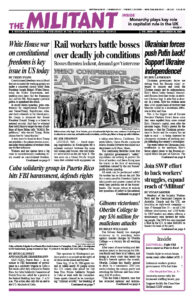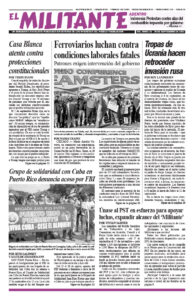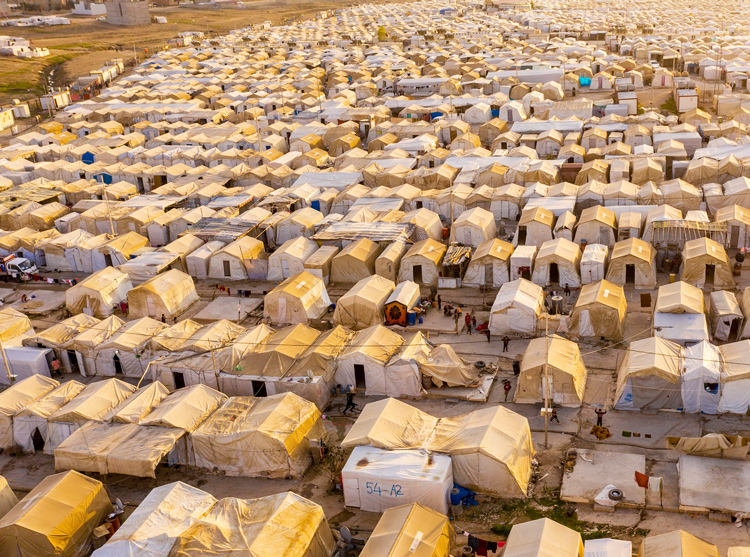LONDON — Eight years after the reactionary Islamic State’s genocidal attack on the Yazidi people in the Sinjar region of northern Iraq, hundreds of thousands of Yazidis remain determined to return to their towns and villages and rebuild their lives, following the defeat of the Islamic State. However, they continue to face enormous political and military obstacles erected by the competing capitalist powers intervening in Iraq, and rival forces within that country itself.
Yazidis are an ethnic minority with their own particular religion living across northern Iraq and parts of Syria.
On Aug. 3, 2014, Islamic State forces that had seized Mosul, Iraq’s second-largest city, invaded Sinjar province, the Yazidi heartland. Some 1,300 people were killed in the first days of Islamic State’s murderous rampage. Thousands of women and children were taken to Mosul and other parts of the Islamist group’s self-proclaimed caliphate, where they were enslaved and sold, used as sex slaves and forced to “convert” to Islam.
In November 2015 a coalition of Kurdish and Yazidi militias retook much of the area, backed by Washington’s air assaults, which destroyed large parts of the town of Sinjar.
Yazidi families are still trying to find the nearly 3,000 people who are missing. Out of a pre-2014 population of 560,000, some 200,000 are still languishing in squalid camps in the Kurdistan region of Iraq, while 160,000 have sought refuge elsewhere.
“We still have our community scattered in more than 15 camps in Kurdistan and Iraq itself,” Haider Elias, president of the U.S.-based Yazidi rights organization, Yazda, told participants at an Aug. 1 online memorial of the Islamic State’s assault.
Sinjar is among the areas of Iraq under dispute between the federal government in Baghdad and the Kurdistan Regional Government in Erbil. Both governments, Yazidi forces, the Iranian and Turkish governments and a range of militias have all been vying for influence there. As the U.S. rulers have scaled back their military intervention in Iraq, these rivalries have sharpened.
Yazidis have made efforts to move back to their hometowns and rebuild despite widespread destruction, lack of basic infrastructure and ongoing clashes between rival forces. At the beginning of May thousands were forced to flee Sinjar to camps in Iraq’s Kurdish region after the Iraqi government launched an attack on Sinjar Resistance Units in Sinuny, the second clash there in a few weeks. At least two people were killed and a dozen wounded in two days of fighting.
The Sinjar Resistance Units (YBS) were formed in alliance with the Kurdistan Workers Party (PKK) in Turkey, in response to the 2014 Islamic State attack. Over decades the PKK has carried out an armed struggle against the government of Turkey, which denies national rights to the Kurdish people of that country.
Local residents of Sinjar took to the streets in response to the assaults, blocking roads to demand all armed forces leave the region. “Please let us lead our life,” Salah Salim told KirkukNow. “We thank everyone who defended our people and land but now we do not want any armed forces except for the local police. We won’t stop till all armed groups retreat.”
Those groups include units of the Popular Mobilization Forces, a militia based among Shiite Iraqis backed by Tehran. It advances the Iranian rulers’ intervention in Iraq, which has expanded their political and military clout across the Middle East.
Yazidis have also been hit by Turkish government attacks. A June 15 airstrike in Sinuny, widely reported to have come from a Turkish drone, killed a 12-year-old boy and injured several members of his family, as well as four YBS militiamen.
In 2020 the Iraqi government and the Kurdistan Regional Government in Erbil signed an agreement that called for withdrawal from Sinjar of all forces other than Iraqi police, with the Kurdish Regional Government having administrative control. Forces in Iraq that are allied with Tehran blocked implementation of the agreement.
In Afrin, an area of Syria controlled by Ankara-backed militias, civil war and oppressive conditions imposed by Islamist forces have reduced the Yazidi community from tens of thousands to a few thousand.
In a solidarity message to the Aug. 1 memorial of the 2014 slaughter, the Communist League in the U.K. said “working people around the world were horrified by the launch of Islamic State’s genocidal campaign against the Yazidi people — the culmination of years of Islamist terror attacks against Yazidis and other minorities in the aftermath of the 2003 U.S.-U.K. invasion of Iraq.”
The ongoing assaults on the Yazidi people “are an indictment of imperialism and its growing world disorder. The horrors visited on the peoples of Iraq, Syria and the region over decades are a glimpse of the future of all of humanity so long as this system of exploitation and oppression remains in place.”
For working-class parties in the U.K. and elsewhere, “telling the truth about the fight of the Yazidi people for their very existence is a basic duty. Nothing shows better the enormous responsibility we have to prevent imperialism’s ongoing march toward fascism and world war.”


